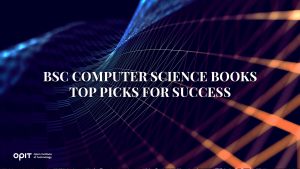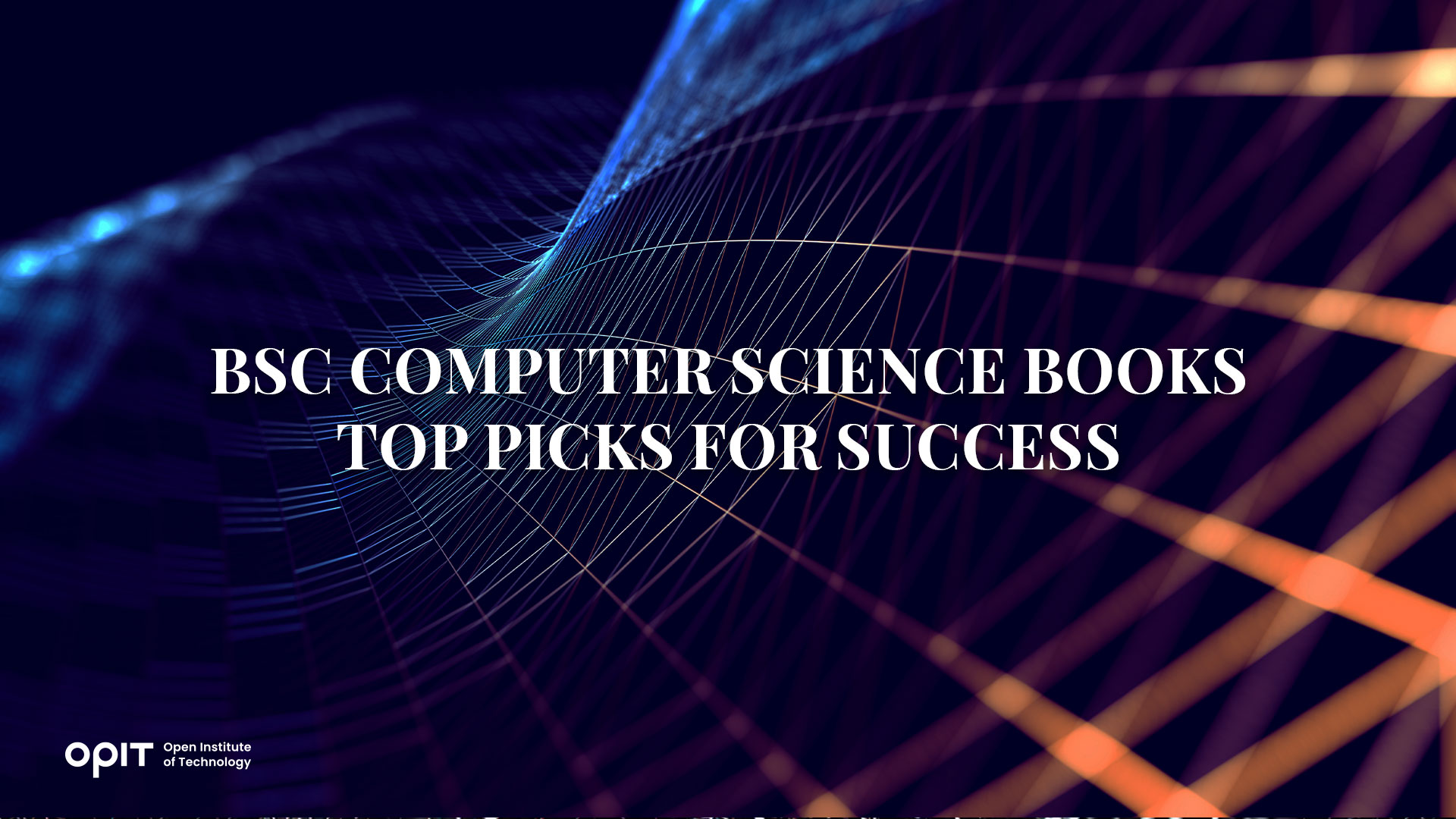

Books represent gateways to new worlds, allowing us to gain valuable knowledge on virtually any topic. Those interested in exploring computer science books face two challenges. First, just like you can’t build a good house without a proper foundation, you can’t expand your knowledge if you don’t understand basic concepts. Secondly, technology is always evolving, so besides understanding how things work, you need to stay current with the latest trends.
Finding books that help you build a good foundation and follow innovations isn’t easy. Fortunately, you don’t have to go through hundreds of titles to find the good ones. Here, we’ll introduce you to the best BSc Computer Science books that will set you up for success.
Top BSc Computer Science Books
These BSc Computer Science books can “program” your mind and help you absorb knowledge.
Introduction to Computer Science
Many people are eager to learn how to program and immerse themselves in the IT world. But the first step toward that is adopting fundamentals. Before jumping into the IT industry, you need to learn more about computer science and the basic concepts behind it.
Computer Science Illuminated by Nell Dale and John Lewis
This student-friendly book sheds light on computer science. It explores operating systems, hardware, software, and networks from “neutral ground” (without focusing on particular programming languages). Therefore, if you don’t “speak” programming languages just yet, this book will be your best friend.
Intro to Python for Computer Science and Data Science: Learning to Program With AI, Big Data, and the Cloud by Paul Deitel and Harvey Deitel
If you want to be a programming expert, you may need to speak Python, a universal language with a wide array of applications. This book teaches you how to use Python in computer science and offers the perfect balance between theoretical and practical knowledge. It transforms complex information into comprehensive and engaging data.
Data Structures and Algorithms
Finding the best BSc Computer Science book on data structures and algorithms can feel like trying to find a needle in a haystack. We found the needle for you and offer the best options.
Data Structures and Algorithms Made Easy by Narasimha Karumanchi
This book is a winner in the data structures and algorithms game. It’s the perfect option for beginners interested in learning the topic from scratch and building a solid foundation for more advanced levels. It covers basic concepts and moves on to more complex stuff without overwhelming the readers.
Data Structures and Algorithms in Java by Robert Lafore
If you’re familiar with Java and want to start with data structures and algorithms, this book is the gold standard. It will guide you on a journey from basic Arrays and Strings to advanced structures like Hash-Tables and Graphs.
Computer Networks
Computer networks are grids through which computing devices “talk to” each other and share data. Here are the books you can use to improve your knowledge and get ahead in your career.
Computer Networks by Andrew S. Tanenbaum
If you want to understand the nitty-gritty behind computer networks, this book is the way to go. Hop on a journey through email, the world wide web, video conferencing, and much more, to understand how the networks work and how to use them to your advantage.
Every chapter follows the same, easy-to-follow structure containing basic principles and real-life examples.
Computer Networking: A Top-Down Approach by James F. Kurose and Keith W. Ross
This beginner-friendly book takes a somewhat unusual approach. It first introduces students to applications and uses them to explain fundamental concepts. That way, students are exposed to the “real world” early on and can understand how networking works with ease.
Operating Systems
An operating system for a computer is like oxygen for a human; it can’t live without it. Operating systems are interfaces that support everything computers do. Here are the best books about them.
Operating Systems: Three Easy Pieces by Remzi Arpaci-Dusseau and Andrea Arpaci-Dusseau
How do operating systems work? What are the three basic concepts hiding behind every OS? Find the answers to these questions and learn everything OS-related in this book. While beginner-friendly, this amazing study can be combined with more advanced materials and offer a deeper understanding of modern OSs.
Guide to Operating Systems by Greg Tomsho
This book represents a detailed guide on installing, updating, maintaining, and configuring operating systems and everything related to them. Besides offering general info, the book explores specific OSs and allows you to peek into this world without feeling overwhelmed.
Database Systems
Database systems are like virtual warehouses where you can keep your data secure. They’re the ones we can “thank” for easy information retrieval, browsing, and organization. If you want to learn the ins and outs of database systems, these books can help.
Database Systems: The Complete Book by Hector Garcia-Molina, Jeffrey D. Ullman, and Jennifer Widom
This book is the holy grail for many computer science students. It offers a comprehensive approach and detailed explanations of everything related to database system design, use, and implementation. The book is extensive, but it’s written in an engaging way, so reading through it is a breeze.
Database Systems: Design, Implementation, & Management by Carlos Colonel and Steven Morris
Building your virtual warehouses for storing data may seem impossible. But it can become your reality thanks to this excellent book. It contains clear and comprehensive instructions on building database systems, offers concrete examples, but also focuses on the bigger picture and latest industry trends.
Software Engineering
Designing and constructing software is no walk in the park. If you’re interested in this industry, you need to build your skills meticulously. Books that can help you on this exciting (and sometimes frustrating) journey are reviewed below.
Clean Code: A Handbook of Agile Software Craftsmanship by Robert C. Martin
In this book, Robert C. Martin, a software engineering legend, discusses the seemingly insignificant differences between bad and poorly-written codes. He explains which “symptoms” bad codes manifest and how to clean them.
Code Complete: A Practical Handbook of Software Construction by Steve McConnell
One of the first (and smartest) steps toward building quality code is getting this book. Here, the author summarized everything there is to know about constructing software. Since the book contains both the basics and the more advanced construction practices, everyone finds it useful, both beginners and pros.
Additional Resources for BSc Computer Science Students
BSc Computer Science books aren’t the only spring you should drink water from if you’re thirsty for knowledge on the subject.
Online Platforms and Courses
Online platforms and courses are great resources for those who want to expand their knowledge and learn how to cash it in. The internet is overflowing with great courses focusing on various aspects of computer science. Here are a few ideas to get you started:
- Open Institute of Technology (OPIT) – The institute offers a comprehensive online BSc in Computer Science. Throughout the program, students get acquainted with everything computer science-related. After completing their studies, they’ll be able to land high-paying jobs.
- Udemy and Coursera – Although not “official” institutes and universities, these platforms deserve a seat at the table. Both Udemy and Coursera offer quality computer science courses held by some of the most respected names in the industry.
Coding Practice Websites
You’ve read books, attended courses, and feel like you know everything there is to know about the theoretical part. But is there a way to put this theory into practice and see whether your codes work? The answer is yes! Practice makes perfect, and coding practice websites will become your best friends and help you conquer programming.
- Coderbyte – Solve real-life coding issues and drive your skills to perfection. With over a dozen available programming languages, you can try out as many ideas as you’d like.
- HackerRank – HackerRank is home to hundreds of coding challenges. Plus, it has leaderboards, so you can see how you compare to other coders. It’s also home to useful tutorials, and since the website is popular, you may even be able to land your dream job.
Computer Science Forums and Communities
Is there a better place for like-minded people to meet and discuss the topics they’re passionate about? Computer science forums and communities should be an important stop on your way to becoming an expert on the subject.
Tips for Success in BSc Computer Science
Success doesn’t happen overnight (at least for most people). If computer science is your true passion, here’s how to master it:
- Focus on the basics to create a good foundation.
- Put your thinking cap on and practice problem-solving and critical thinking skills.
- Participate in group projects and collaborations (teamwork makes the dream work).
- Keep up with the latest industry trends.
- Gain valuable hands-on experience through internships.
Acquire Computer Science Knowledge Effectively
Although books don’t offer practical knowledge, they can be invaluable allies in setting a great theoretical foundation. By carefully choosing the best books and putting effort into developing your skills, you’ll become a pro in a jiff.
Have questions?
Visit our FAQ page or get in touch with us!
Write us at +39 335 576 0263
Get in touch at hello@opit.com
Talk to one of our Study Advisors
We are international
We can speak in:




